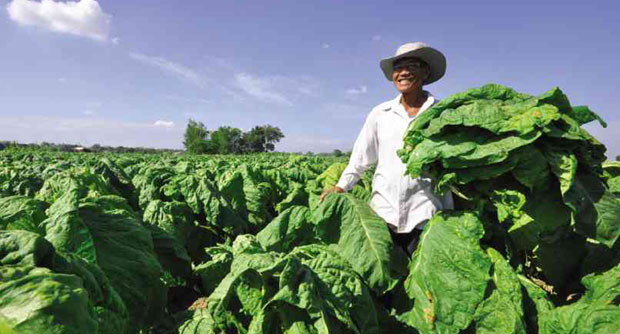Pangasinan farmers pin hopes on tobacco

PROUD FARMER Elmer Godoy admires his tobacco harvest from his farm in Barangay Amamperez in Villasis town, Pangasinan province. WILLIE LOMIBAO/CONTRIBUTOR
VILLASIS, Pangasinan—If they had a choice, farmers Alejandra Lavarias and her husband, Nicanor, would not have planted tobacco almost 50 years ago.
This is because tobacco farming at that time did not pay much and it was a backbreaking job.
But they had no choice. They were tenants when they moved to Barangay (village) Amamperez here in 1966 and at that time, they had nothing else to plant after the rice season but “batek” (native tobacco). Besides, there were no irrigation facilities then, preventing them from planting rice for the second cropping season.
Today, the Lavariases, like other tobacco farmers in their village, still wake up at 3 a.m. to tend their tobacco plants until noon. “This is really a hard job,” said Alejandra, now 74. “But we don’t have any other source of livelihood.”
Tobacco season begins in September just when the rainy season is about to end and when palay (unhusked rice) have all been harvested. It is in this month when Alejandra and her husband begin plowing and harrowing the field before sowing tobacco seeds in time for transplanting by November.
Article continues after this advertisement“Every day, we have to see to it that there are no weeds, that they are watered and that they are free from pests,” Alejandra said.
Article continues after this advertisementBy January, they gather the primings, locally called “liso” or the leaves near the bottom of the stalk. The following month, the larger upper leaves are harvested.
The leaves are then put one by one into a 2-foot bamboo stick and then hung in a sunlit area until the leaves turn golden brown. Then these are stacked and covered in a dry place until they are completely dried and ready to be sold by May.
Production cost
Elmer Godoy, another farmer in the village, said that these days, a tobacco farmer spends at least P50,000 from planting to harvesting in a hectare of farm.
The money is spent for fertilizers, pesticides, tractor rentals and hiring of farm hands, especially during transplanting and harvesting seasons.
“On a good year, our money becomes double,” Godoy said. “But after paying all your debts, there’s just little money left for you and your family,” he added.
Most tobacco farmers in the village borrow money from traders at the start of the season. “It’s easier to borrow from them. All they need is your signature and you have instant cash for your farm needs,” Godoy said.
But the downside, he said, is that traders demand that they be paid with the tobacco the farmers have produced.
“What is not good about this is that the traders dictate the price, leaving the tobacco farmers with very little money,” Godoy said.
For instance, if the prevailing price of a “pardo” (120 sticks of dried tobacco leaves) is P6,000, the trader’s price is lowered to P5,000.
“The ones getting rich are the traders. They get rich at the expense of tobacco farmers. They make money more than the farmers,” Alejandra said.
Bank collateral
She said borrowing money from banks would have been an option, but tobacco farmers are also helpless because banks need collateral. “We are just tenants. What collateral could we produce?” she said.
Despite their situation, the Lavariases and Godoy were able to send their children to college. But the money they used for their tuition came partly from their production of rice and onion, crops that they planted after the tobacco season.
Alejandra said tenants like her and her husband would always remain poor despite the booming tobacco industry. Their share, she said, is only a third of the total farm produce while the rest goes to the landowner.
Godoy, who started farming as a tenant in 1968, is luckier. In 1980, he was able to buy the
1-hectare farm he was tilling. Seventeen years later, he bought 2 ha more and built a two-story house near his farm.
But like many tobacco farmers, Godoy and the Lavariases hoped the government would help them ease their burden every tobacco season.
Godoy said the government should provide them with easy, low-interest loans, fertilizer subsidy and farm implements to make their farming less expensive.
Their wish may just be granted.
Excise taxes
Last month, Edgardo Zaragoza, administrator of the National Tobacco Administration, told tobacco farmers in La Union province that his office, together with the Department of Finance and the Department of Budget and Management, was working on the revised implementing rules and regulations on the use of the increased excise taxes imposed on cigarettes.
Zaragoza said that this time, they wanted to ensure that the excise taxes would directly benefit tobacco farmers.
In 2013, he said, excise tax collection more than doubled, increasing to P67 billion from only P32 billion in 2012.
The increase was triggered by the enactment in December 2012 of Republic Act No. 10351, or the sin tax law, which took effect in January 2013.
But Zaragoza said the higher collection from sin taxes in 2013 would be felt only in 2015 because in a given year, the amount of excise tax collections that have to be divided among beneficiaries is based on the collections two years ago.
He also said that under the law, a province and a congressional district get a 30-percent share each, while a town gets 40 percent.
Alejandra said she had not heard yet about the excise tax. In her village, she said, she did not seem to have felt its impact.
But she hoped that when the time comes, she and her husband would be among the tobacco farmers who would benefit from the law.
For now, Alejandra said, her only wish is a good price for the native tobacco that she and her husband had grown.